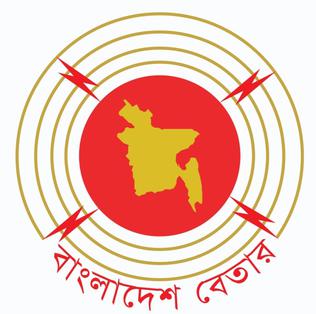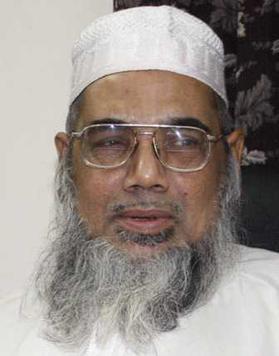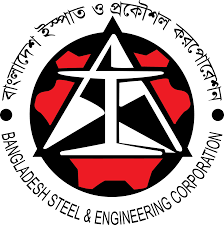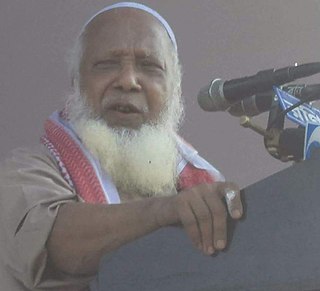
Bangladesh Bank is the central bank of Bangladesh and is a member of the Asian Clearing Union. It is fully owned by the Government of Bangladesh.

Bangladesh Television, commonly known by its acronym BTV, is the state-owned television network of Bangladesh. The network was originally established as the East Pakistan branch of PTV in 1964. It is the oldest Bengali-language television network in the world, and is the sister to the radio broadcaster Bangladesh Betar, which, along with BTV, are both owned and operated by the government.

Bangladesh Betar, or BB is the state-owned radio broadcaster of Bangladesh, initially established as the Dhaka station of All India Radio in 1939. It was later made part of Radio Pakistan. After the independence of the country in 1971, Radio Pakistan ceased transmissions there and the Swadhin Bangla Betar Kendra was renamed to Bangladesh Betar, which took full control of all radio stations in the country at the time.

Agrani Bank PLC. is a state-owned commercial bank of Bangladesh established in 1972. Its headquarters is situated at Motijheel in Dhaka, the capital city of Bangladesh. Murshedul Kabir is the CEO and managing director of Agrani Bank.
Motijheel is a central business district and a thana of Dhaka, Bangladesh. It is Dhaka's primary central business district, and also the nation's largest commercial and financial hub. Motijheel, located immediately adjacent to Dhaka's zero point, has the largest number of offices in Dhaka. Motijheel CBD also has one of the highest concentrations of high-rise buildings in Bangladesh. It has thus earned the title of the downtown and city centre of Dhaka and as the bankpara-officepara in Bengali.
Bangladesh is a developing country with an impoverished banking system, particularly in terms of the services and customer care provided by the government run banks. In recent times, private banks are trying to imitate the banking structure of the more developed countries, but this attempt is often foiled by inexpert or politically motivated government policies executed by the central bank of Bangladesh, Bangladesh Bank. The outcome is a banking system fostering corruption and illegal monetary activities/laundering etc. by the politically powerful and criminals, while at the same time making the attainment of services or the performance of international transactions difficult for the ordinary citizens, students studying abroad or through distance learning, general customers etc.

Faḍl al-Ḥaqq ibn Wājid ad-Dīn al-Amīnī, or simply Fazlul Hoque Amini was an Islamic scholar and politician from Bangladesh. He served as an MP in the Parliament of Bangladesh from 2002 to 2007. He was an expert in the fields of Islamic jurisprudence (fiqh), hadith and tasawwuf. He also held a number of positions on the boards of qaumi madrasahs. He was also the principal of Jamia Qurania Arabia Lalbagh in Lalbagh, Dhaka, one of the largest Deobandi Islamic schools of Bangladesh.

Hefazat-e-Islam Bangladesh is a far-right conservative-islamic advocacy group consisted mostly of hard-line religious teachers and students. The group is mainly based on qawmi madrasas in Bangladesh. In 2013, they submitted a 13-point charter to the Government of Bangladesh, which included the demand for the enactment of a blasphemy law.

The Shapla Square protests also known as Operation Shapla or Operation Flash Out by security forces refers to the protests, and subsequent shootings, of 5 and 6 May 2013 at Shapla Square located in the Motijheel district, the main financial area of Dhaka, Bangladesh. The protests were organized by the Islamist advocacy group, Hefazat-e Islam, who were demanding the enactment of a blasphemy law. The government responded to the protests by cracking down on the protesters using a combined force drawn from the police, Rapid Action Battalion and paramilitary Border Guard Bangladesh to drive the protesters out of Shapla Square.

Gulistan is one of the busiest commercial areas in Dhaka, Bangladesh. A major transportation node, it originated around a now-demolished Pakistan-era cinema hall and is now a hub for commercial activity, particularly consumer goods. The area houses several important government establishments, including the Bangabandhu National Stadium. However, Gulistan suffers from issues such as overcrowding, traffic congestion, and criminal activity due to its dense population and commercial nature.
The Security Printing Corporation (Bangladesh) Ltd. is the main printer of banknotes and government postal stamps in Bangladesh. Established in 1988, it started its operation initially as a project of the Bangladesh Bank. Since April 1992, it is running its business as an autonomous organization constituted under the existing law of the country. It is the regular member of International Government Printers Association. Its clients for high quality four colour postage stamps include Nepal.
The Ministry of Religious Affairs is the ministry responsible for religious events, buildings, and Hajj in Bangladesh.

Bangladesh Steel and Engineering Corporation or BSEC, is a government owned corporation in Bangladesh.
Bangladesh Agricultural Development Corporation or BADC, is an autonomous government body that manages the agricultural Inputs Supplier i.e. agricultural seeds, non-nitrogen fertilizer and Minor Irrigation facilitating to farmers of Bangladesh and is located in Motijheel Thana, Dhaka, Bangladesh.

Maulana Abdul Malek Halim is a Bangladeshi Islamic scholar and Nayeb-e Ameer of Hefazat-e-Islam Bangladesh. Abdul Malek Halim is the pioneer of Qawmi Mohila (Female) Madrasa in Bangladesh and the founder of Al-Jamiatul Arabia Lil Baneena Wal Banaat Haildhar, the first Qawmi Madrasa having female branch. At present, Abdul Malek Halim is serving as the principle of the Madrasa. Abdul Malek Halim is also serving as the senior vice-chairman of Islami Oikya Jote. He is an ex-chairman of Nizam-e-Islam Party.
The Bangladesh Stationery Office is a Bangladesh government agency responsible for supplying stationery to government offices throughout Bangladesh.

Jamiat Ulema-e-Islam Bangladesh is a Bangladeshi Islamist Party registered with Bangladesh Election Commission. Jamiat Ulema-e-Islam Bangladesh was a member of the Islamist 20-Party alliance. It was a member of Islami Oikya Jote and which it left in 2008.

Mamunul Haque is a Bangladeshi Deobandi Islamic scholar, politician, academic, writer, editor, and social reformer. He is the former joint secretary general of Hefazat-e-Islam Bangladesh, secretary general of Bangladesh Khelafat Majlish, Shaykh al-Hadith of Jamia Rahmania Arabia Dhaka, founder of Babri Mosque Bangladesh, editor-in-chief of Monthly Rahmani Paigam, president of Bangladesh Khelafat Youth Majlish and Khatib at Baitul Mamur Jame Mosque. He is also a leading figure in several organizations, including Rabetatul Waizin Bangladesh, an organization of Islamic speakers in Bangladesh. He is particularly popular with the hard-line speaks against atheists, secularists, anti-Islamist and was arrested for leading the movement in this regard. 65 organizations including Bangladesh Awami League, Chhatra League, Jubo League have started a massive movement across the country demanding banning, arrest and exemplary punishment of him for promoting Islamic fundamentalism.













